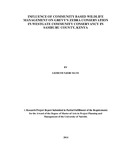| dc.description.abstract | Community based Wildlife Management (CWM) is a conservation approach whereby
stewardship of wildlife rests at the local and not state level. It asserts that it is possible to
improve rural livelihoods, conserve the environment as well as promote economic growth. The
Grevy’s zebra is one of the world’s endangered mammal species. Over the past 18 years the
population has declined by more than 50% leaving less than 2800 individuals in the wild
particularly to the north of the equator in Kenya and south Ethiopia. This rapid decline has been
caused by competition for resources with expanding human livestock populations, habitat
degradation as well as loss of migration and dispersal areas for these animals. The purpose of
the study was to examine the influence of community based wildlife management on Grevy’s
zebra conservation in Westgate Community Conservancy in Samburu County. The study was
guided by four research objectives; to examine how community rangeland practices, community
by-laws, conservation benefits accrued to the community and conservation education of the
community influence Grevy’s zebra conservation in Westgate Community Conservancy in
Samburu County. The study employed a descriptive survey design. The population for the study
was 4000 and the sample size comprised of 351 community members. Data was collected by use
of questionnaires. Construct validity was ensured by carrying out a pilot study. Findings revealed
that majority (90.4%) of the respondents indicated that planned grazing as a rangeland practice
had the greatest influence on Grevy’s zebra. conservation. The study also established that
community by laws had a positive influence to Grevy’s zebra conservation as indicated by 72.4%
of respondents who said that that the established by laws should remain and the 74.5 % of
respondents who indicated that they comply with the laws. Further findings indicated that
conservation benefits accrued to community such as improved infrastructure, employment within
the conservancy and tourism influence Grevy’s zebra conservation to a very great extent. Asked
whether they would still conserve the wildlife if these benefits were withdrawn, 72.4 % of the
respondents indicated that they would. As regards to conservation education, 90.4 % and 86.5 %
of the respondents indicated that personnel from the conservancy and local barazas respectively
played a very big role in providing conservation education to the community. This implies that
community awareness has high conservation returns of Grevy’s zebra conservation. 78.7% of the
respondents indicated that Grevy’s zebra population has increased in the last ten years and gave
conservation education, good grazing lands and high birth rates as the top reasons for the
increase. The study lastly concluded that community involvement in activities/meetings had
increased regarding conservation issues. Based on the findings above, the study recommends that
the community should be encouraged to form more environmental clubs in the school. The
community conservancy personnel should increase awareness on the existence of environmental
conservation and natural resource management courses to the community members.
Furthermore, effective community participation should involve more than just attending
meetings and volunteering for conservation activities. It is imperative that communities be
actively involved in decision making processes at every level of wildlife management in order to
create a sense of ownership in Grevy’s zebra conservation. Lastly, there should be promotion of
equitable benefit sharing mechanisms among the different zones in the communities as members
living in certain zones indicated that they felt marginalized in distribution of employment
opportunities. Further research is recommended to examine the influence of other key
stakeholders involved in wildlife conservation. | en_US |

